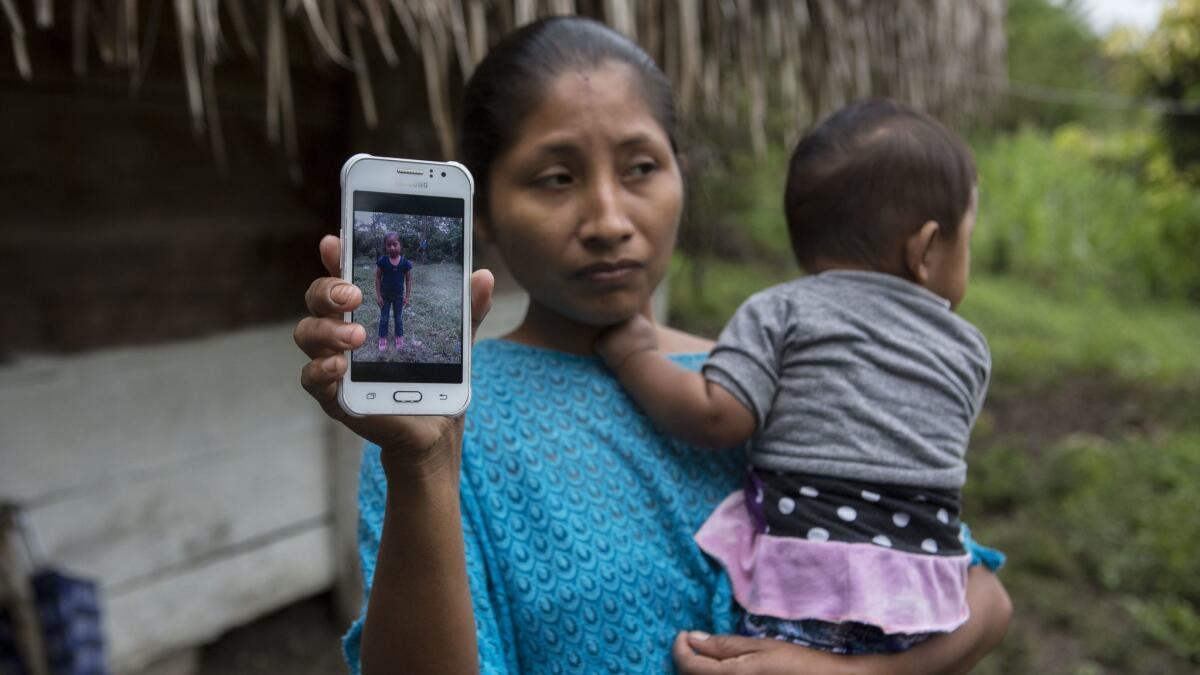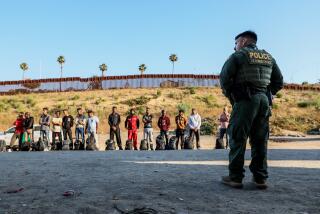Family of migrant Guatemalan girl disputes official story of her death

Reporting from El Paso — Nery Gilberto Caal Cuz, 29, a Guatemalan migrant who crossed into the U.S. from Mexico with his daughter Jakelin, contends she was well nourished and hydrated before dying in Customs and Border Protection’s custody, contesting official accounts of the 7-year-old’s death.
A statement released Saturday by Caal’s lawyers calls for the release of Jakelin’s records from the El Paso County Medical Examiner’s Office and Providence Children’s Hospital to provide him with details on her Dec. 8 death. He also called, through his attorneys, for an objective investigation of the tragedy.
“The family intends to assist in such an investigation into the cause and circumstances of Jakelin’s death,” a statement from the El Paso-based law offices of Enrique Moreno and Lynn Coyle said.
Jakelin, who had turned 7 just days prior to dying in the border agency’s custody, was apprehended with her father on Dec. 6 near Lordsburg, N.M. The two were planning to seek asylum in the U.S. along with other migrants they had met on the way to the U.S.-Mexico border.
At first, the two were taken along with more than 100 other detainees to a small outpost near the Antelope Wells port of entry, officials said. After she began vomiting several hours later, she was taken on a bus with others to the larger Lordsburg facility — a 90-minute journey.
Her father, his lawyers said, was not flown with his daughter from there to Providence Children’s Hospital two hours away, where she died after suffering a heart attack. Tests at the hospital showed the girl had suffered from dehydration and exhaustion, a Customs and Border Protection official told reporters in a conference call Friday, and the agency claimed the girl had not had food or water for several days.
In Roma, Texas, residents must choose: Help Border Patrol, or border crossers? »
Providence officials could not immediately be reached for comment.
In his statement, Jakelin’s father said he was grateful for first responders who tried to save her life.
A prayer service was held for her on Friday night at La Paz funeral home in El Paso, according to Ruben Garcia, executive director of Annunciation House, a nonprofit that provides support to migrants and refugees.
The organization has retained the El Paso lawyers to represent Nery Caal.
Caal has stayed in one of Annunciation House’s facilities since Dec. 9. He has opted not to talk directly to the media, Garcia said.
“This is an event that has lots of implications,” Garcia said.
Jakelin’s body is being sent from El Paso to Raxruha, a small town in Guatemala’s Alta Verapaz state.
On Friday, Customs and Border Protection released official details of Jakelin’s death in a statement welcoming an investigation by the Department of Homeland Security.
“Border Patrol agents, including trained emergency medical technicians, did everything in their power to provide emergency medical assistance for Jakelin Caal Maquin,” said agency Commissioner Kevin K. McAleenan.
The White House defended the Border Patrol on Friday, with a deputy press secretary going so far as to place responsibility for the death on the girl’s father. The border agency’s week-long delay in disclosing the death — and the circumstances surrounding it — prompted sharp questions from Congress members whose committees have oversight over the agency but were not notified in a timely fashion.
Caal and his daughter came to the U.S. looking to seek asylum, but once in Customs and Border Protection custody, he quickly ran into a language barrier with the agents, the lawyers said.
His first language is Q’eqchi’ and Spanish is his second, but all the forms he was asked to sign were in English, the statement read.
“It is unacceptable for any government agency to have persons in custody sign documents in a language that they clearly do not understand,” it said.
Montes is a special correspondent.
More to Read
Sign up for Essential California
The most important California stories and recommendations in your inbox every morning.
You may occasionally receive promotional content from the Los Angeles Times.









